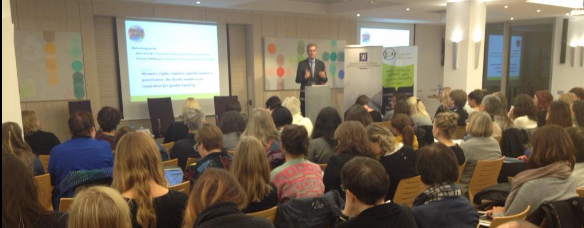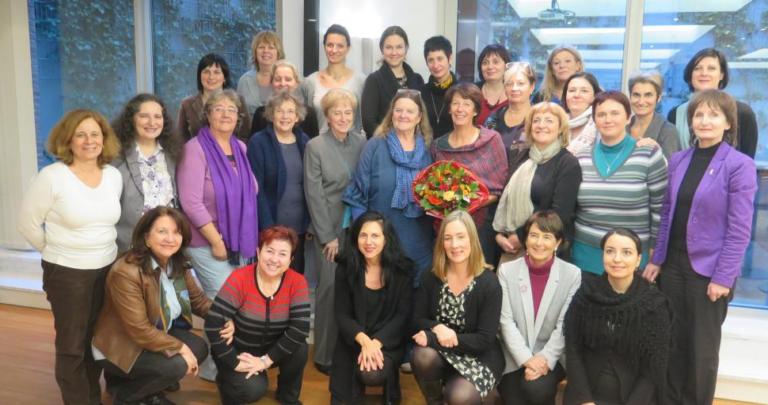[Brussels, 25 October 2011] The Turkish and Kurdish women’s association, Roj Women, has published a Press Release highlighting the results of the EWL Barometer on violence against women, stressing how the Turkish National Action Plan fails to adequately address this widespread human rights abuse. The EWL recently had the pleasure to hear from and exchange with the ROJ Women’s Association on the ocasion of the event in the European Parliament co-organised by the EWL on 20 September on the theme of violence against women. Please find their Press Release below.
The European Women’s Lobby evaluates Turkish National Action Plan to combat violence against women
Although political commitments to eliminate violence are being made in political debates, the discourse often stays as rhetoric: the budget allocated to public institutions to combat violence against women is far from adequate.
The EWL has just released a mapping report of national action plans (NAP) on violence against women, including the Turkish plan. The study reports that despite the extreme gravity of this phenomenon, political responses and resources allocated to this issue have been piecemeal, unequal and mostly inadequate at both national and European level.
In South East Turkey 1 out of 2 women are victims of violence against women. The national average is 39%. In a context of social and economic development neglect, pervasive patriarchal attitudes and militarization all contribute to high rates of violence against women in the southeastern region. Overall, the legal and policy framework guaranteeing women’s rights and gender equality is broadly in place in Turkey. The National Action Plan to combat violence against women is the one of the measures that could potentially transform political will into action. It covers specific forms of violence against women and it has a gender perspective.
However, the European Women’s Lobby study reports that although political commitments to eliminate violence are being made, the discourse often stays as rhetoric. This is because resources to ensure the sustainability of such policies are not sufficient, and the budget allocated to public institutions to combat violence against women is far from adequate. From its part, Roj Women welcomes the new Ministry of Family and Social Policies’ recent declaration that it has now its own budget, but more concrete information on the amount allocated to the plan is demanded. After years of failure to assign an appropriate budget to important tools to fight violence against women, such as the National Action Plan to combat violence against women, a stronger pledge is expected from the government. An example that illustrates how the failure to earmark money for its implementation has rendered the NAP ineffective is the the last EU Progress Report 2011 statement that “efforts to eliminate gender bias from school textbooks at all levels of education and training have yet to produce the desired results”, despite the NAP’s objective since 2007 to identify sexist language and pictures in text books and to replace them with emancipatory content which is free of gender stereotyping.
Improving the willingness of the government to strengthen cooperation with women’s movement, both for the implementation and evaluation of the NAP’s objects is deemed as an urgent necessity by the EWL’s report. Roj Women’s Association adds that a comprehensive mechanism for monitoring and evaluating with detailed benchmarks and timelines that does not rely on each enforcing party’s self-assessment is also essential. This is so not only because otherwise enforcing parties are unable to map out progress and gaps, but also because civil society is unable to fulfill its role as ombudsman of the Turkish State’s performance. The General Directorate on Women’s Status has admitted that it does not plan to conduct an independent evaluation or to evaluate performance against a blueprint in the near future. Instead, monitoring and evaluation responsibilities lie with the Monitoring Committee. It is unclear how this committee operates though. While the Directorate claims that enforcing parties of the Plans meet every six months to self-monitor their own effectiveness no information is disclosed on who attends these meetings, when do they take place, what matters are discussed or what decisions are taken. Lack of accountability of this Monitoring Committee becomes evident in the difficulties of civil society organizations to access records of “monitoring meetings?.
Regional disparities are indeed another important point in the organization’s campaigning. There is a need to consider regional disparities when addressing women’s rights, as the scale of the issues is larger in Southern and East Turkey and as there are additional factors to consider when designing projects and policies to tackle gender inequality and violence against women in such regions. Higher poverty levels in Southeastern Turkey as well as a ban to provide education in languages other than Turkish put Kurdish speaking girls at disadvantage in the region. While the national participation of women in Turkey in the labour force is appalling (30%), this figure is lower for Southeastern Turkey where it is estimated to be less than 10%. In addition there are higher illiteracy rates among women (double than in West Turkey), higher levels of violence against women (50% versus 39% national average) and and higher maternal mortality rates in the region. The NAP unfortunately does not have a strategy to tackle regional gaps in levels of violence against women.
Women’s organizations are looking forward to seeing these shortcomings addressed by the new NAP.



